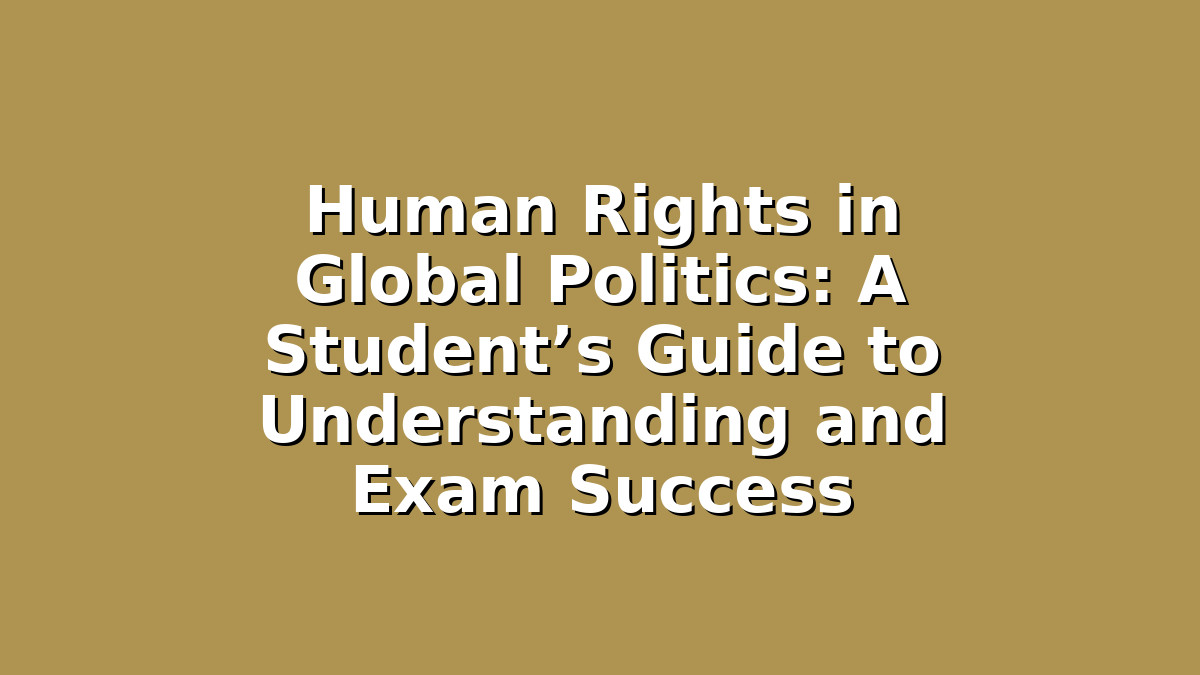When preparing for exams in subjects like politics, international relations, or global studies, understanding the concept of human rights in global politics is crucial. Human rights are fundamental to how countries interact, negotiate, and sometimes conflict on the world stage. For students, grasping this topic not only enriches your knowledge but also strengthens your ability to critically analyze global events and policies. In this article, we will explore human rights in global politics, break down key concepts, and provide targeted study tips to help you excel in your exams.
Introduction to Human Rights in Global Politics
Human rights refer to the basic rights and freedoms that belong to every person in the world, regardless of nationality, ethnicity, gender, or religion. These rights include freedom of speech, the right to education, freedom from torture, and many others. In global politics, human rights form the foundation of international law and diplomacy, influencing how nations interact with one another and how international organizations operate.
As a student, you may find the topic overwhelming due to its broad scope and the complex ways human rights are protected or violated around the world. However, breaking it down into manageable sections and using strategic study methods can make mastering this subject more achievable.
—
Section 1: Understanding Key Human Rights Concepts and Frameworks
Before diving into case studies or real-world applications, build a strong foundation by understanding the core concepts and frameworks underpinning human rights in global politics.
Key Concepts to Focus On:
– Universal Declaration of Human Rights (UDHR): Adopted by the United Nations in 1948, this document outlines fundamental human rights recognized globally.
– International Human Rights Law: Includes treaties like the International Covenant on Civil and Political Rights (ICCPR) and the International Covenant on Economic, Social and Cultural Rights (ICESCR).
– Sovereignty vs. Intervention: Understand debates about state sovereignty and the international community’s responsibility to protect citizens from human rights abuses.
– Human Rights Organizations: Learn about the role of the UN Human Rights Council, Amnesty International, Human Rights Watch, and others.
Study Tip: Create flashcards for each key term or document. Writing the definitions and important facts on one side and examples or significance on the other will help reinforce your memory. Review these flashcards regularly to build your confidence.
—
Section 2: Analyzing Case Studies of Human Rights in Action
Case studies provide practical insights into how human rights issues play out in global politics. These examples help you understand the challenges and complexities governments and international bodies face.
Popular Case Studies to Review:
– The Rwandan Genocide (1994): A tragic failure of the international community to prevent mass atrocities, highlighting debates about intervention.
– South Africa and Apartheid: A successful example of international pressure and sanctions leading to systemic change.
– The Syrian Civil War: Ongoing conflict with widespread human rights violations, refugee crises, and challenges for international responses.
– Universal Healthcare Access: Examining countries’ obligations under economic and social rights and global disparities.
Study Tip: When studying case studies, try to summarize each one in your own words and identify the main human rights issues, the actors involved, and the outcome. Creating mind maps linking the case study to global human rights concepts will help you see bigger patterns and connections.
—
Section 3: Developing Exam Strategies for Human Rights Topics
Exams often test not just your knowledge but your ability to apply concepts and argue your points clearly. Here are some strategies specifically tailored to human rights topics in global politics.
1. Practice Writing Structured Essays:
Use the PEEL method (Point, Evidence, Explanation, Link) to structure your paragraphs. For example, if asked about the effectiveness of international human rights laws, start with your point, follow with evidence from specific treaties or cases, explain the significance, and link back to the question.
2. Use Comparative Analysis:
Many exam questions ask you to compare different approaches or cases. Prepare by contrasting examples like how the international community responded to Rwanda versus Syria.
3. Keep Up with Current Events:
Human rights is a dynamic field. Reading credible news sources and reports from organizations like the UN or Human Rights Watch can give you up-to-date examples to use in essays and discussions.
4. Practice Past Exam Questions:
Familiarize yourself with question styles and time management by practicing past papers or example questions. This will reduce anxiety and improve your ability to think critically under exam conditions.
—
Conclusion
Human rights in global politics is a vital and fascinating topic that combines legal principles, ethical debates, and real-world challenges. For students aiming to excel in their exams, understanding the basic concepts, analyzing case studies thoughtfully, and honing exam strategies are key steps to success. Remember, studying human rights not only prepares you for tests but also equips you with a deeper awareness of the world’s most pressing issues. Stay curious, keep practicing, and approach your studies with confidence—you’ve got this!

Responses